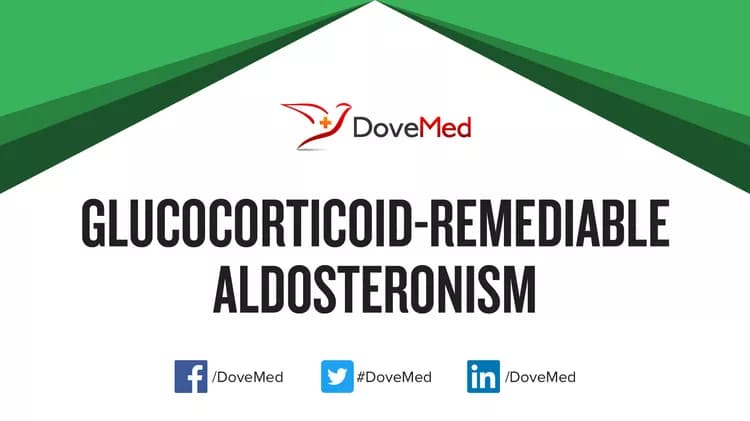What are the other Names for this Condition? (Also known as/Synonyms)
- Dexamethasone Sensitive Hypertension
- Familial Hyperaldosteronism Type 1
- Glucocorticoid Sensitive Hypertension
What is Glucocorticoid-Remediable Aldosteronism? (Definition/Background Information)
- Glucocorticoid-Remediable Aldosteronism is one of three types of familial hyperaldosteronism. Aldosterone is a hormone manufactured by the adrenal glands which helps the body retain water and sodium and excrete potassium
- Glucocorticoid-Remediable Aldosteronism is caused by a fusion of the CYP11B1 and CYP11B2 genes and is inherited in an autosomal dominant manner
- Individuals with this condition usually have hypertension (high blood pressure) before age 21. These individuals are also at an increased risk for a certain type of stroke known as a hemorrhagic stroke
- First-line therapy consists of a steroid such as prednisone, dexamethasone, or hydrocortisone. This will often correct the overproduction of aldosterone, lower the blood pressure, and correct the potassium levels
(Source: Glucocorticoid-Remediable Aldosteronism; Genetic and Rare Diseases Information Center (GARD) of National Center for Advancing Translational Sciences (NCATS), USA.)
Who gets Glucocorticoid-Remediable Aldosteronism? (Age and Sex Distribution)
- Glucocorticoid-Remediable Aldosteronism is a rare congenital disorder. The presentation of symptoms may occur in childhood, adolescence, or adulthood
- Both males and females may be affected
- Worldwide, individuals of all racial and ethnic groups may be affected
What are the Risk Factors for Glucocorticoid-Remediable Aldosteronism? (Predisposing Factors)
- A positive family history may be an important risk factor, since Glucocorticoid-Remediable Aldosteronism can be inherited
- Currently, no other risk factors have been clearly identified for this condition
It is important to note that having a risk factor does not mean that one will get the condition. A risk factor increases one’s chances of getting a condition compared to an individual without the risk factors. Some risk factors are more important than others.
Also, not having a risk factor does not mean that an individual will not get the condition. It is always important to discuss the effect of risk factors with your healthcare provider.
What are the Causes of Glucocorticoid-Remediable Aldosteronism? (Etiology)
- Glucocorticoid-Remediable Aldosteronism is caused by an unequal crossing-over of the long arm of chromosome 8, leading to CYP11B1 and CYP11B2 gene fusion. This leads to excessive aldosterone synthesis
- The condition is inherited in an autosomal dominant manner
Autosomal dominant inheritance: Autosomal dominant conditions are traits or disorders that are present when only one copy of the mutation is inherited on a non-sex chromosome. In these types of conditions, the individual has one normal copy and one mutant copy of the gene. The abnormal gene dominates, masking the effects of the correctly function gene. If an individual has an autosomal dominant condition, the chance of passing the abnormal gene on to their offspring is 50%. Children, who do not inherit the abnormal gene, will not develop the condition or pass it on to their offspring.
What are the Signs and Symptoms of Glucocorticoid-Remediable Aldosteronism?
The signs and symptoms of Glucocorticoid-Remediable Aldosteronism may include:
- Abnormality of the urinary system
- Adrenogenital syndrome
- Decreased circulating renin level
- Dexamethasone-suppressible primary hyperaldosteronism
- Hypertension
- Hyperaldosteronism
Very frequently present symptoms in 80-99% of the cases:
- Abnormal circulating renin
- Adrenal hyperplasia
Frequently present symptoms in 30-79% of the cases:
- Caesarian section
- Epistaxis
- Headache
- Hypokalemia
- Intracranial hemorrhage
- Muscle weakness
- Nausea
- Polydipsia
- Preeclampsia
- Secretory adrenocortical adenoma
- Tinnitus
(Source: Glucocorticoid-Remediable Aldosteronism; Genetic and Rare Diseases Information Center (GARD) of National Center for Advancing Translational Sciences (NCATS), USA.)
How is Glucocorticoid-Remediable Aldosteronism Diagnosed?
Glucocorticoid-Remediable Aldosteronism is diagnosed on the basis of the following information:
- Complete physical examination
- Thorough medical history evaluation
- Assessment of signs and symptoms
- Laboratory tests
- Imaging studies
- Biopsy studies, if necessary
- Molecular genetic testing to check for or confirm the presence of the CYP11B1 and CYP11B2 hybrid gene
Many clinical conditions may have similar signs and symptoms. Your healthcare provider may perform additional tests to rule out other clinical conditions to arrive at a definitive diagnosis.
What are the possible Complications of Glucocorticoid-Remediable Aldosteronism?
The complications of Glucocorticoid-Remediable Aldosteronism may include:
- Emotional stress
- High blood pressure without treatment, which can lead to heart attack or stroke
Complications may occur with or without treatment, and in some cases, due to treatment also.
How is Glucocorticoid-Remediable Aldosteronism Treated?
- There is no cure for Glucocorticoid-Remediable Aldosteronism, since it is a genetic condition
- However, the condition can be efficiently managed with glucocorticoids, to reduce the levels of aldosterone; children may be prescribed eplerenone to keep side effects to a minimum
- A combination of dexamethasone with mineralocorticoid receptor antagonist may be necessary in some cases for high blood pressure
How can Glucocorticoid-Remediable Aldosteronism be Prevented?
Currently, Glucocorticoid-Remediable Aldosteronism may not be preventable, since it is a genetic disorder.
- Genetic testing of the expecting parents (and related family members) and prenatal diagnosis (molecular testing of the fetus during pregnancy) may help in understanding the risks better during pregnancy
- If there is a family history of the condition, then genetic counseling will help assess risks, before planning for a child
- Active research is currently being performed to explore the possibilities for treatment and prevention of inherited and acquired genetic disorders
Regular medical screening at periodic intervals with tests and physical examinations are recommended.
What is the Prognosis of Glucocorticoid-Remediable Aldosteronism? (Outcomes/Resolutions)
- The prognosis of Glucocorticoid-Remediable Aldosteronism is considered to be good, if the condition is managed with medication(s)
- However, without treatment, high blood pressure may lead to heart attack and stroke, which may be life-threatening
Additional and Relevant Useful Information for Glucocorticoid-Remediable Aldosteronism:
The following DoveMed website link is a useful resource for additional information:
Related Articles
Test Your Knowledge
Asked by users
Related Centers
Related Specialties
Related Physicians
Related Procedures
Related Resources
Join DoveHubs
and connect with fellow professionals


0 Comments
Please log in to post a comment.